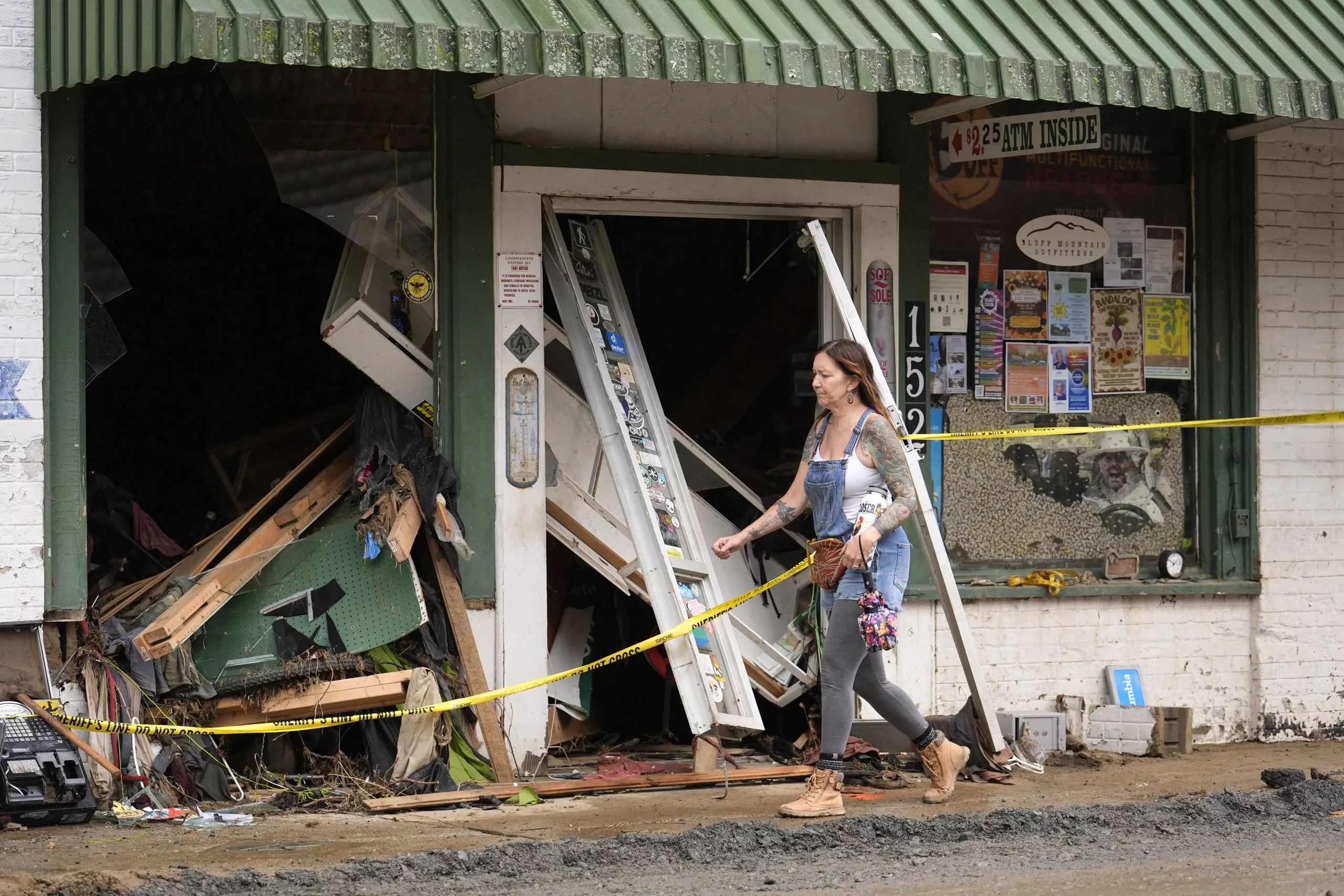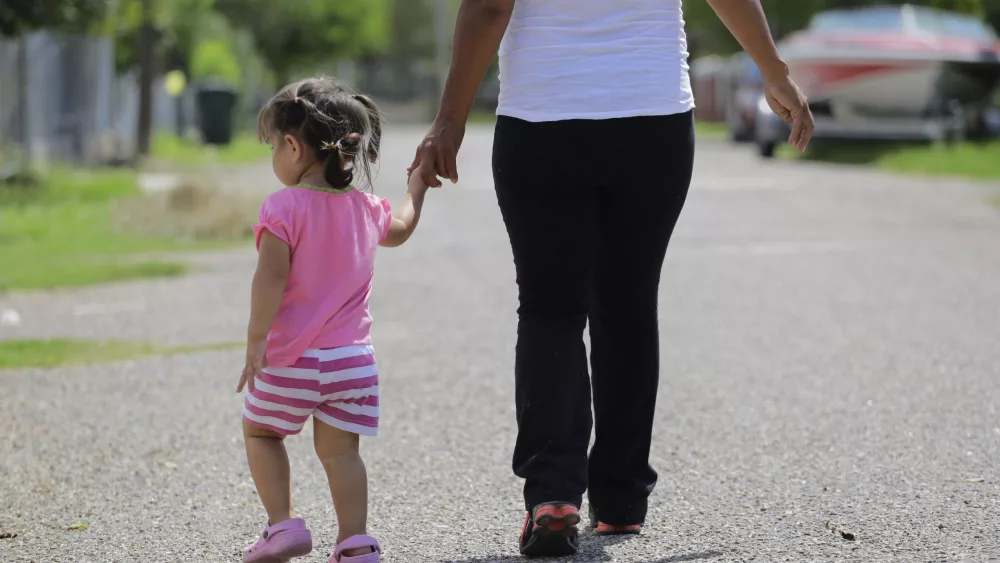ASHEVILLE, N.C. (AP) — North Carolina election officials say they will do everything in their power to ensure that voters in the crucial presidential swing state will be able to cast their ballots despite the devastation of Hurricane Helene and the destruction of basic infrastructure only about a month before the November election.
Karen Brinson Bell, the executive director of the state’s election board, said Tuesday that 12 county election offices in the hard-hit western part of the state remain closed after the storm unleashed “unprecedented” damage. Absentee ballots, some of which already have been mailed to voters who requested them, also face obstacles, from U.S. Postal Service delays to road and residential damage that could render them undeliverable. The viability of early and Election Day voting sites remains unknown, she said.
She described the storm as causing a “daunting” level of uncertainty, with early in-person voting scheduled to start in just over two weeks on Oct. 17. Still, she said the state is prepared to help voters navigate the emergency.
“We’ve battled through hurricanes and tropical storms and still held safe and secure elections, and we will do everything in our power to do so again,” Brinson Bell told reporters during a media call. “Mountain people are strong, and the election people who serve them are resilient and tough, too.”
Helene, which battered large swaths of the Southeast late last week with torrential rain and strong winds and massive storm surges along the Gulf Coast, caused devastation “beyond belief” in the popular mountain city of Asheville and other parts of western North Carolina, Gov. Roy Cooper said during a media briefing Tuesday.
“This disaster is unlike anything our state has ever experienced,” he said.
The level of destruction could have far-reaching implications beyond the immediate damage to the flooded communities, especially if it has any impact on voting. North Carolina is among seven swing states being hotly contested by Vice President Kamala Harris, the Democratic nominee, and former President Donald Trump, the Republican nominee. Trump barely defeated Democrat Joe Biden in the state four years ago, winning by about 74,500 votes out of 5.5 million cast.
Asheville is the most populous city in the 25-county region under a disaster declaration and is a Democratic stronghold. The counties surrounding it are largely Republican, so the eventual impact on any statewide race, including a nationally watched contest for governor, is unknown.
On Tuesday, emergency workers were still engaged in rescue efforts across the broad swath of the Southeastern U.S. that bore the brunt of the storm. Election officials in Florida, Tennessee and the presidential battleground of Georgia were assessing the damage and the potential impacts to mail balloting, early voting and Election Day operations.
Georgia election workers have returned to work even as some offices face power outages, limited internet and infrastructure damage. Absentee ballots are scheduled to go out on Oct. 7 as planned, said Robert Sinners, communications director for Georgia’s secretary of state.
In North Carolina, officials said they are considering moving or combining voting locations if some are unusable or inaccessible.
More urgently, state officials are offering guidance and some special accommodations for absentee voters, who may not receive their ballots because of evacuations, suspended Postal Service operations or residential mailboxes swept away in the storm.
Paul Cox, general counsel for the North Carolina State Board of Elections, said displaced voters can contact their county election office to request that their absentee ballot be spoiled and sent to a different location. They also can use the state’s BallotTrax service to track their ballot’s location.
Those voters also have the option of waiting to cast a ballot in person, either during the early voting period of Oct. 17 to Nov. 2 or on Election Day, Nov. 5, Cox said. State law requires all voters to show voter ID, but those who are from a county under a disaster declaration and have lost their ID can fill out an exception form so they can cast a ballot.
Officials are still weighing whether to take further steps to accommodate voters, such as extending the absentee ballot deadline or allowing more people to cast ballots through an online portal already used by military, overseas and visually impaired voters, Brinson Bell said.
The Postal Service said in a statement Monday that it is “still assessing damage and impacts” and is communicating with local election boards in the affected areas to “ensure the ongoing transport and delivery of Election Mail as soon as it is safe to do so.”
Kelly Godfrey, who has lived in Asheville for over three years, is one of the few voters who returned their absentee ballot before the storm hit. In Buncombe County, which includes Asheville, nearly 9,990 voters had requested absentee ballots as of Tuesday — 85% of them Democrats or voters who are not affiliated with any party, according to Associated Press election research. Only about 170 had been returned.
Godfrey said she hopes rules and procedures will be adjusted to make it easier for voters who were displaced by the storm. She worries that any changes could lead to misinformation and false claims of voter fraud after the election.
“It’s going to be spun a lot of different ways,” she said.
For now, though, voting feels “so far out in the distance,” Godfrey said. “Right now, people are thinking food and water.”
Brinson Bell said officials were not aware of any physical damage to election offices or the voting equipment or ballots stored inside them, but they are in close communication with tabulation machine vendors should any machines need to be repaired or replaced.
Some of the county boards whose offices remain closed or are dealing with outages have been given special emergency kits from the state, which were initially intended for use in case of a ransomware attack, she said. The kits are equipped with laptops, cellphones, Wi-Fi hotspots and other essentials to allow election operations to continue even without power, phone or internet service.
___
Swenson reported from New York and Fernando reported from Chicago. Associated Press writers Charlotte Kramon in Atlanta and Gary Robertson in Raleigh, North Carolina, contributed to this report.
___
The Associated Press receives support from several private foundations to enhance its explanatory coverage of elections and democracy. See more about AP’s democracy initiative here. The AP is solely responsible for all content.
Brought to you by www.srnnews.com








